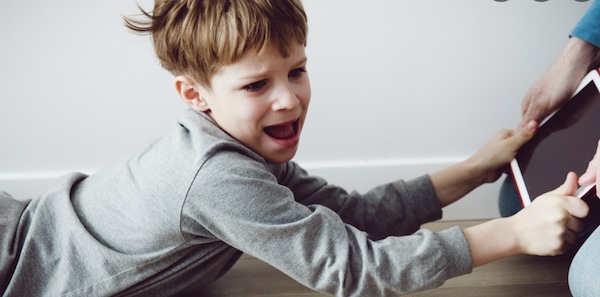
Breaking screen addiction – is it possible? Many parents feel helpless and hopeless in dealing with their child’s technology addiction. Often the addiction is at the stage where it is affecting every member of the family in some way. In this article, we look at some of the ways to break the cycle of addiction to devices. Regain your happy and healthy child, and family harmony by following the steps below.
Breaking free of an unhealthy relationship with technology is like breaking free from a drug addiction.
As a Parent, are you Setting a Good Example?
Consider your own digital habits. If you were to break up with your phone, tablet or computer it would be challenging, but achievable. The driving factor is your determination and the reason for wanting to change. Success is determined by:
- Your determination to reduce time spent on your devices, and
- Your concern that this time could be impacting your mental health.
Sometimes people think their addictive smartphone habits are fine because that’s what everyone else does. These days the mindset tends to be “everyone needs to know what I’m doing”. Unfortunately though many of us often do not appreciating our solitude. It becomes a habit to log into social media to see who is doing what, or tweeting about our lives.
This psychological problem runs so deep within the addict that psychologists believe it could be classified as similar to an eating disorder. Not just in terms of its effects on physical health, but because it can be connected to mental health and identity issues.
Many people analyze what they do online by asking themselves whether or not their internet usage resembles any form of mental illness – such as obsessive-compulsive behavior or anxiety disorders. The fact that this question can take you from being obsessed over your social media feeds to worrying about even more serious illnesses highlights how deeply ingrained our dependence has become.
The struggle lies so deep within us that some psychologists believe it could actually be classified as a mental illness in and of itself; just think about how addicted we have become to the internet, social media, smart phones- all these things can make life much more complicated than before they became such staples in society!
Breaking away from your addiction to technology isn’t always easy because there are many factors at play here. Technology has been around for decades now and really only progressed over time until smartphones were introduced onto the market which completely overhauled everything yet again – suddenly people’s lifestyles changed drastically without them even knowing what was happening! It may seem harmless enough but when you combine phone use with your other devices, the amount of time you spend online is huge.
Technology addiction is real and growing. Unlike many other addictions, technology addicts may not be aware of their problem because it’s so deep in our psyche.
Breaking YOUR Screen Addiction
Do you have a technology addiction – is that the role model you want to be for your child? Breaking free from unhealthy habits can require more than just willpower- the same goes for breaking away from tech overuse and addictive behavior patterns. Psychologists are debating whether or not this type of attachment to devices should even legally count as an issue on its own merit; others argue there might need to be specific regulations set up around certain things such as texting hours before bedtime (which has been shown to disrupt sleep).
Technology is a society-changing invention, but as with any innovation, there are downsides. If someone has gone too deep down the slippery slope of technology overload and needs to do something about it then one step would be doing a complete technology detox.
A person disappears down an electronic black hole every day only to wake up hours later in front of some screen again without having done anything else during that time period if not for staring at said screen or interacting on social media channels like Facebook . The first thing someone should do when getting themselves out this downward spiral – which many have fallen prey to – is go through a full scale tech detox where no screens whatsoever may enter your life until you’re completely ‘cured’ of the addiction.

If a friend or loved one is addicted to technology, they need to go through a full scale tech detox where no screens whatsoever may enter their life until their craving has subsided enough that you can have more control over what goes into their system. This includes social media platforms like Facebook and Instagram as well as video games such League Of Legends which are designed for gamers’ every waking moment in front of an electronic display.
The detox period should last from 4 – 6 weeks, as this is the period of time psychologists suggest it takes a hyper-aroused nervous system to reset itself.
When your Child needs to Break a Screen Addiction
If your child is the addicted person, they are usually unable to go cold-turkey into a digital detox because of the addictive nature of social media and video games. If you as a parent are used to resistance and fights from your children when asking them to get off devices, get ready for strong resistance when you suggest the digital detox. Explain to them why you are asking them to do this, and how they will benefit from it. And remember, YOU control the plug. You are the adult!
Consider giving your child a week to reduce their time on devices, until it is zero. If you are considering this option for yourself or would like more information about how to go through with the process of reducing device usage in general then read these helpful tips:
- Discuss the decision together and come up with an agreement that works best for everyone involved
- Identify what they use smart phones/tablets primarily for so as not to overlook anything important
- Create some fun activities for when kids have down-time without being plugged into devices
- Lead by example if you are also doing a digital detox at the same time.
It is not easy to wean your kids off electronics, but it will be worth the results.
In my experience with raising children, I have found that they struggle at first when we take away screen time and reconnect them back with nature. They can’t stand the thought of going an entire day without their screens or tablets; however after about two days into this new routine you’ll start seeing great changes in how they act towards others as well as themselves- so don’t lose hope! After a week of no screens you will see more quality family bonding and healthier sleep patterns for everyone in your household!
Be Prepared for a Withdrawal Period
Just as with drug detox, there will be a withdrawal period for the digital detoxing child. They are likely to experience headaches and irritability during this time of adjustment. It is important that parents ready their children for these feelings so they don’t feel too overwhelmed or discouraged by them.
During the detoxing period, children need to be constantly busy and engaged. Getting out in nature is beneficial for their health! Parents should plan ahead by getting their kid outside a lot – get them playing with friends, take walks together through your neighborhood where trees might grow taller than buildings… just do whatever it takes to make sure that these few weeks of cleansing aren’t too tough on everyone involved.
Break the screen addiction and go into the outside world

Digital detoxing requires getting kids to communicate more with others in real life. A great way is by playing board games or card games that require face-to-face interaction, and encouraging children’s curiosity about their surroundings through nature scavenger hunts or simply going on walks together as a family.
The act of digital detoxing can be made much more fun for your child if you try mixing up the types of activities they’re used to doing online with ones involving physical contact like walking around an unfamiliar neighborhood looking for bugs, leaves, rocks; playing outdoor sports like football (soccer) where both teams are mixed out in the open instead of sitting behind screens watching one another play video game versions virtually from home.
The key to regaining balance in life is building a sense of community and belonging while creating fun experiences with others. The key to building a happy, well-balanced childhood is simple: create community and family. This can be done in many ways such as creating memories with friends at the beach or making new ones by joining an after school club where they play games together every day!
Alliance for Childhood
The Alliance for Childhood, a consortium of some of the top education and mental health experts in the country, make several recommendations to combat technology’s erosion of a happy, healthy and balanced childhood.
They recommend:
- Exposure to Nature
- Unstructured Play
- Maintaining close and loving relationships with adults
- Opportunities to engage in music, drama, painting and other arts
- Activities that involve creative verbal expression, like poetry and storytelling.
Conclusion
At a societal level we have failed to pay attention while our children and young people have succumbed to the spell of technology, letting the technology control them rather than the other way around. Could it be that we are also under the spell of our devices? Constantly checking our phone and social media channels? Are we setting a poor example to our children?
There is no doubt that technology is now an integral part of our world. However health and happiness are possible in a tech-saturated world. We, as parents and educators, need to be informed and careful about the traps that lurk in the e-cave, before we and our kids fall in too deep.




